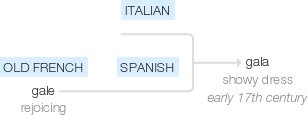Gala
early 17th century (in the sense ‘showy dress’): via Italian and Spanish from Old French gale ‘rejoicing’.
wiktionary
From French gala, or directly from that word's etymon, which is either Italian gala, [1] or Spanish gala, [2] both meaning "festive occasion", and derived from Old French gale(“rejoicing”). (The French word likely kept the final -a to avoid homophony with gale(“scabies”).) Ultimately cognate to gallant and hence probably from Frankish *wala(“good, well”). [1] [2]
Sumerian 𒍑𒆪(gala), cognate to Akkadian 𒍑𒆪(kalû). A connection to the similar Phrygian and Roman priests of Cybele called gallae or galli has been suggested, but evidence is lacking. [1]
etymonline
gala (n.)
1620s, "festive dress or attire" (obsolete), from French en gala, perhaps from Old French gale "merriment," from galer "rejoice, make merry" (see gallant). Klein suggests the French word is from Italian gala (as in phrase vestito di gala "robe of state"), perhaps from Arabic khil'a "fine garment given as a presentation." Sense of "festive occasion" (characterized by display of finery) first recorded 1777. Quasi-adjectival use in gala day "day of festivities," etc.
